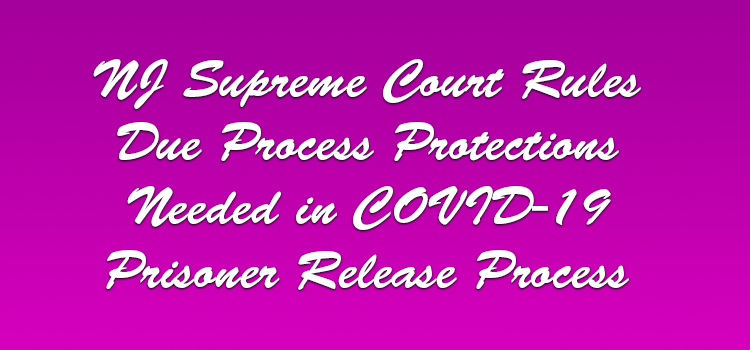
The Supreme Court of New Jersey recently held that due process protections must be added to the process by which New Jersey prisoners may seek a medical furlough under Executive Order 124. Specifically, the court held in In the Matter of the Request to Modify Prison Sentences, Expedite Parole Hearings, and Identify Vulnerable Prisoners (M-1093-19/084412)(June 5, 2020S) that inmates must be given an opportunity to be heard and to learn why a medical furlough was denied.
Facts of the Case
The Office of the Public Defender and the American Civil Liberties Union of New Jersey (ACLU) applied directly to the New Jersey Supreme Court for relief relating to the spread of the coronavirus in prison settings. They essentially asked the Judiciary to order a framework for the early release of several groups: adults and juveniles serving a sentence that will expire in the next year; individuals eligible for parole; and any defendant who is particularly vulnerable to COVID-19.
On April 10, 2020, two days after the Public Defender and ACLU wrote to the Court, the Governor issued Executive Order 124. Executive Order 124 created a mechanism to identify inmates in state prison to be considered for parole or a medical furlough due to the COVID-19 pandemic. The Executive Order provides two tracks for review, directing the Parole Board to expedite its consideration of inmates for parole and the Commissioner of the Department of Corrections (DOC) to decide whether to grant a medical furlough — an “emergency medical temporary home confinement.”
Consistent with existing law, the Parole Board provided inmates with an individualized statement of reasons for cases in which it denied parole. Inmates denied a medical furlough received a two-sentence form letter from the Commissioner that notified them of the outcome but did not set forth any reasons. Inmates denied parole have an avenue for appeal; inmates denied a medical furlough under the Executive Order do not.
As to the two tracks the Executive Order created to consider inmates for release, the Parole Board has been considering inmates in a manner consistent with existing practices. That includes various due process protections that attach to the parole process. Through a different process, the Commissioner, with help from the Review Committee, has been addressing medical furloughs.
New Jersey Supreme Court’s Decision
“We hold that because the order creates a sufficient expectation of eligibility for release through a furlough program, the order calls for certain due process protections,” Chief Justice Stuart J. Rabner wrote on behalf of the unanimous court. “At a minimum, due process requires notice and an opportunity to be heard.”
According to the court, the following protections must be added to the Executive Order to comport with due process:
(1) inmates are to be afforded an opportunity to present a written statement in support of their request to be furloughed in the same way that prosecutors and victims are allowed to express their views. Inmates may proceed on their own or with the help of volunteer lawyers. The Public Defender’s Office has volunteered its assistance and should be provided with the lists of eligible inmates generated under the Order, under seal, subject to a protective order;
(2) the Commissioner is to provide a statement of reasons to inmates who are denied a medical furlough to help guard against mistakes and arbitrary decisionmaking and allow for meaningful judicial review if it is sought; and
(3) inmates are to be given an opportunity to respond in order to try to satisfy the Commissioner’s concerns and cure any mistakes. The Commissioner shall consider each response before issuing a final decision.
The New Jersey Supreme Court further held that inmates may challenge the DOC’s action, a final agency decision, by seeking review before the Appellate Division. Individual inmates may also seek relief independently under Rule 3:21- 10(b)(2). Moreover, they do not have to exhaust the remedies available under the Executive Order before they may file a motion in court.
The court also expressed concerns about timeliness. “Because of the risks COVID-19 poses, which are amplified in jail settings, each day matters,” Chief Justice Rabner wrote. “To the extent this opinion calls for trial judges to rule on motions and the Appellate Division to review agency decisions, we exercise the court’s supervisory authority to require that applications be heard and decided in a matter of days.”
